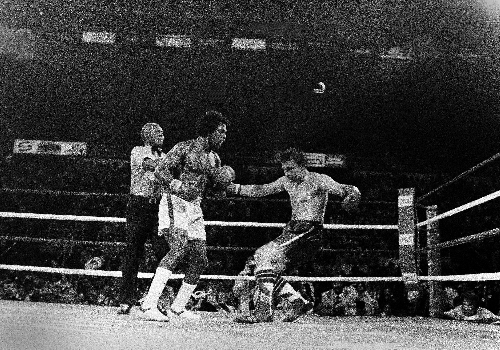Retirement fund for boxers and fighters urged
CARSON CITY -- To Assemblyman Harvey Munford, it is a matter of fairness.
Nevada gains millions of dollars off boxers at the top of their careers, so it is only fair that the state come up with a plan to at least cover their medical expenses when they are retired and destitute, he said.
Munford, D-Las Vegas, said Thursday he has asked legislative lawyers to write up a bill that would set up a fund to help down-and-out boxers and mixed martial arts fighters cover medical expenses -- and possibly give them pensions -- after their careers are over.
While the details would be fleshed out during legislative hearings in 2011, he proposes to secure funds by taking a percentage of the gate of boxing matches and mixed marital art events.
Munford, a retired teacher who is seeking re-election, said he received a call a few months ago from Michael Dokes, the heavyweight boxing champion in the 1982-83 period.
"He fought some key fights in Las Vegas," Munford said. "He told me he became ill and went to the University Medical Center. Because he was an indigent, he was treated for a couple of days and then released. They told him they could no longer treat him."
Munford said professional baseball, football, basketball and hockey offer pensions and medical programs for their former athletes, so similar programs should be created for boxers.
"There needs to be a fund for them," Munford said. "We need to look out for their welfare after they are finished."
A similar cry to help boxers with medical bills was made after boxer Z "The Dream" Gorres suffered brain injuries at a fight Nov. 13 in Las Vegas.
His medical bills topped $600,000, and a state law requires promoters to carry only $50,000 in medical insurance for fighters. Some said the insurance requirement should be increased to $1 million.
Munford said that he would not mind amending his bill to look at the medical insurance issue.
Keith Kizer, executive director of the Nevada Athletic Commission, saluted Munford for his proposal but said it will be a "tough sell."
Kizer said boxing matches are held around the world, so it would be hard to secure sufficient funds from events held just in Nevada.
"A boxer may fight in Las Vegas, but then has a fight in New Jersey and then in Poland," Kizer said.
He said there have been discussions in boxing circles over the years about providing pensions, but nothing has ever been done.
What boxers earn varies widely, he noted.
"You may have a boxer earn $30 million and on the same card have someone who is paid $500," Kizer said.
While funds may be taken out of the gate to create the fund, Kizer said promoters probably would end up reducing what they pay fighters. For fighters, the most important thing is not what happens to them when they are retired, but getting paid a lot of money now, he said.
Marc Ratner, former executive director of the Nevada Athletic Association and now vice president of regulatory affairs for the Ultimate Fighting Challenge, sees merit in Munford's proposal.
"There are a lot of questions that first need to be answered," Ratner said. "How do you qualify? Do you have to have fought so many rounds, or for so many years?"
He said there are differences between boxers and mixed marital arts performers.
"For one thing, they don't take repeated head blows," he said. "Many have high school wrestling backgrounds and have wrestled in college."
They also tend to come from more middle-class backgrounds than boxers, and have resources to fall back on, said Ratner, noting the sport is just 18 years old.
Many boxers historically have come up from poverty, he said.
Contact Capital Bureau Chief Ed Vogel at evogel@reviewjournal.com or 775-687-3901.























